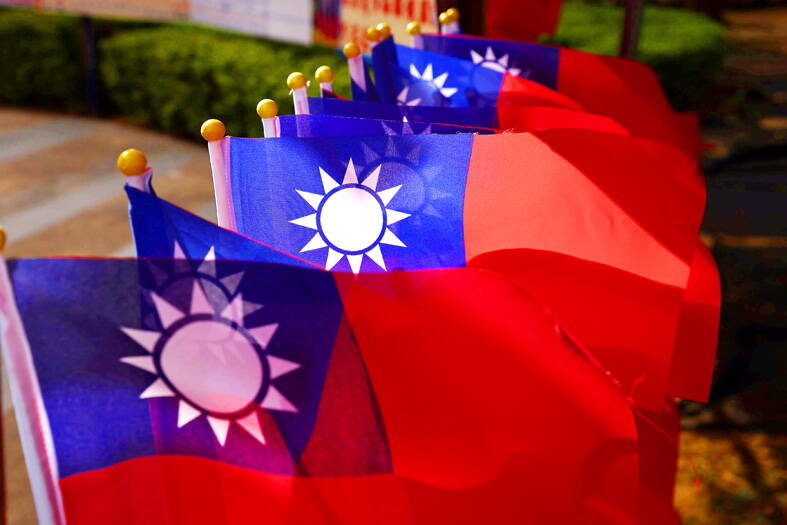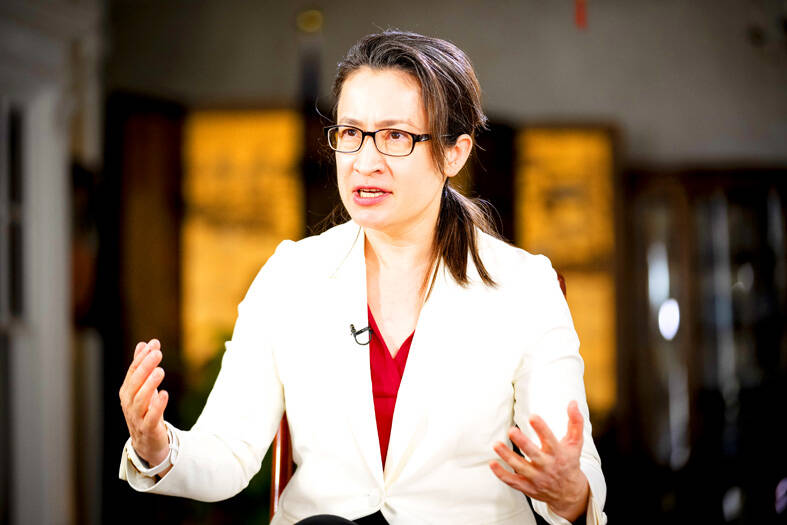Beijing has no right to decide or define how Taiwan engages with the world, Representative to the US Hsiao Bi-khim (蕭美琴) said in an interview with The Associated Press on Friday.
The interview came after a year of higher tensions with China, including China launching ballistic missiles over Taiwan and temporarily suspending most dialogue with the US after then-US House of Representatives speaker Nancy Pelosi visited Taiwan in August.
Asked if new US House Speaker Kevin McCarthy should make good on his earlier pledge to visit Taiwan as well, Hsiao said. “That will be his decision. But I think ultimately the people of Taiwan have welcomed visitors from around the world.”

Photo: Ann Wang, Reuters
Beijing’s leadership “has no right to decide or define how we engage with the world,” she added.
Hsiao spoke at Twin Oaks, the more than 130-year-old hilltop mansion that Taiwan uses for official functions in Washington. She talked on a range of Taiwan-US military, diplomatic and trade relations issues shaped by intensifying rivalries with China.
No Taiwanese flag flew over the building, reflecting Taiwan’s in-between status as a US ally that nonetheless lacks full US diplomatic recognition. The US withdrew that in 1979, on the same day it recognized Beijing as the sole government of China.

Photo: AP
In Washington, Taiwan’s self-rule is one issue that has strong support from both parties.
US administrations for decades have maintained a policy of leaving unsaid whether the US military would come to Taiwan’s defense if China did invade.
China’s military shows of force after Pelosi’s visit had some in the US Congress suggesting it was time for the US to abandon that policy, known as “strategic ambiguity,” and to instead make clear Americans would fight alongside Taiwan.
Asked about those calls on Friday, Hsiao only praised the existing policy.
“It has preserved the status quo for decades, or I should say it has preserved peace,” she said.
US President Joe Biden has repeatedly volunteered in public comments that the US would come to Taiwan’s defense, only to have aides walk that back with assurances that strategic ambiguity still prevails.
Meanwhile, after watching the Ukrainians’ successful hard-scrabble defense against invading Russian forces, Taiwan realizes it needs to load up on Javelins, Stingers, High Mobility Artillery Rocket Systems and other small, mobile weapons systems, Hsiao said.
The Taiwanese and Americans have reached agreement on some of those, she said.
Taiwan is pushing to make sure that a shift to grittier, lower-tech weapon supplies for Taiwanese ground forces “happens as soon as possible,” Hsiao said.
Even with the US and other allies pouring billions of dollars of such weapons into Ukraine for the active fight there, straining global arms stocks, “we are assured by our friends in the United States that Taiwan is a very important priority,” she said.
Taiwan has learned important lessons from Ukraine’s war that would help it deter any attack by China or defend itself if invaded, she said.
Among the lessons: Do more to prepare military reservists and also civilians for the kind of all-of-society fight that Ukrainians are waging against Russia.
“Everything we’re doing now is to prevent the pain and suffering of the tragedy of Ukraine from being repeated in our scenario in Taiwan,” she said. “So ultimately, we seek to deter the use of military force. But in a worst-case scenario, we understand that we have to be better prepared.”
Ukraine’s experience has had lessons for the US and other allies as well, she said, including the importance of a united allied stand behind threatened democracies.
“It’s critical to send a consistent message to the authoritarian leaders that force is never an option ... force will be met by a strong international response, including consequences,” Hsiao said.
Hsiao would not directly address a report by Nikkei Asia on Friday that US National Guard members had begun work training in Taiwan, saying only that Taiwan was exploring ways to work with the guard members to improve training.

The CIA has a message for Chinese government officials worried about their place in Chinese President Xi Jinping’s (習近平) government: Come work with us. The agency released two Mandarin-language videos on social media on Thursday inviting disgruntled officials to contact the CIA. The recruitment videos posted on YouTube and X racked up more than 5 million views combined in their first day. The outreach comes as CIA Director John Ratcliffe has vowed to boost the agency’s use of intelligence from human sources and its focus on China, which has recently targeted US officials with its own espionage operations. The videos are “aimed at

STEADFAST FRIEND: The bills encourage increased Taiwan-US engagement and address China’s distortion of UN Resolution 2758 to isolate Taiwan internationally The Presidential Office yesterday thanked the US House of Representatives for unanimously passing two Taiwan-related bills highlighting its solid support for Taiwan’s democracy and global participation, and for deepening bilateral relations. One of the bills, the Taiwan Assurance Implementation Act, requires the US Department of State to periodically review its guidelines for engagement with Taiwan, and report to the US Congress on the guidelines and plans to lift self-imposed limitations on US-Taiwan engagement. The other bill is the Taiwan International Solidarity Act, which clarifies that UN Resolution 2758 does not address the issue of the representation of Taiwan or its people in

US Indo-Pacific Commander Admiral Samuel Paparo on Friday expressed concern over the rate at which China is diversifying its military exercises, the Financial Times (FT) reported on Saturday. “The rates of change on the depth and breadth of their exercises is the one non-linear effect that I’ve seen in the last year that wakes me up at night or keeps me up at night,” Paparo was quoted by FT as saying while attending the annual Sedona Forum at the McCain Institute in Arizona. Paparo also expressed concern over the speed with which China was expanding its military. While the US

SHIFT: Taiwan’s better-than-expected first-quarter GDP and signs of weakness in the US have driven global capital back to emerging markets, the central bank head said The central bank yesterday blamed market speculation for the steep rise in the local currency, and urged exporters and financial institutions to stay calm and stop panic sell-offs to avoid hurting their own profitability. The nation’s top monetary policymaker said that it would step in, if necessary, to maintain order and stability in the foreign exchange market. The remarks came as the NT dollar yesterday closed up NT$0.919 to NT$30.145 against the US dollar in Taipei trading, after rising as high as NT$29.59 in intraday trading. The local currency has surged 5.85 percent against the greenback over the past two sessions, central